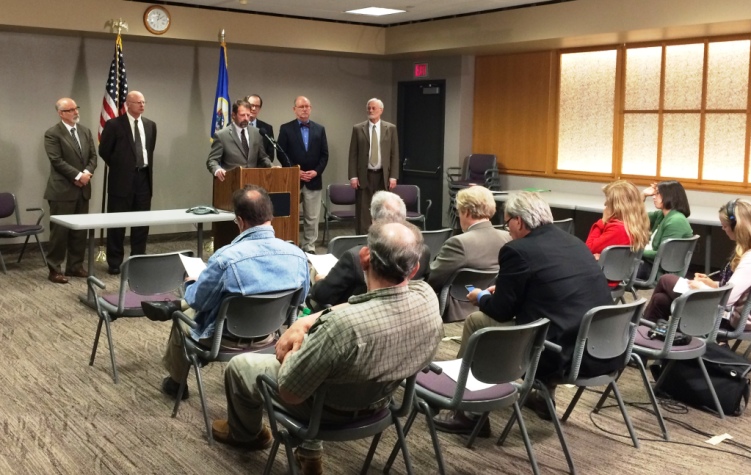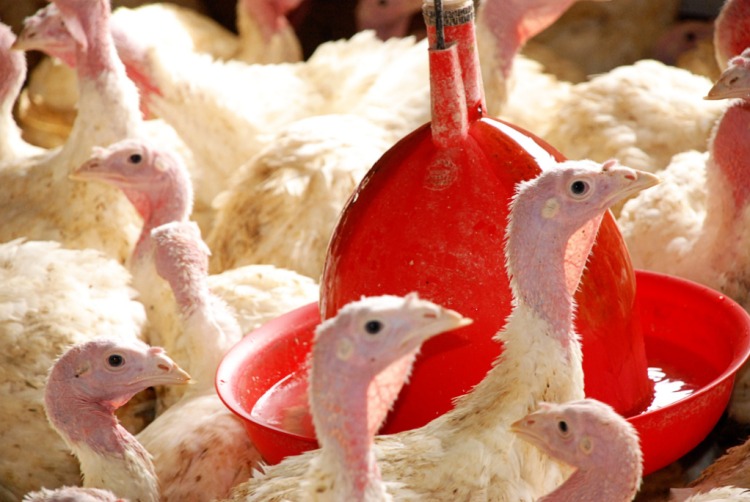If you live in Minnesota and watch or read the local news, it’s been pretty hard to miss the almost daily reports of a deadline avian flu hitting turkey flocks in Minnesota. I’ve written about it for Agriculture.com (most recently here) but I haven’t covered it too much on my blog.
It’s hard to put into words what this outbreak is like for those of us who work with turkey farmers on a daily basis. For so many people right now, this is all we’re working on. This is priority #1.
It makes us all worry. No doubt about it. This deadly strain of influenza – which hasn’t been seen in the U.S. until this year – kills turkeys within a few hours of finding its way into a barn. A turkey farmer I know told the Star Tribune, “It’s kind of similar to knowing that there is a burglar in the neighborhood, but you don’t know where he’s going to hit.”
It takes an emotional toll on farmers. Imagine watching hundreds of the birds you are caring for die quickly with absolutely nothing you can do to ease their discomfort. It’s horrible. And I’m not talking about the financial aspect of losing birds – I’m talking emotionally, as human beings. Then imagine having to put the rest of your healthy birds down in order to stop the chances of the virus spreading. It’s the worst thing imaginable for a farmer – to have to euthanize healthy birds.
And yes, there are financial repercussions. It would be foolish not to mention the financial repercussions of this virus. Turkey farmers don’t buy insurance for disease – there is no such thing. They also do not get reimbursed for any birds that die of avian influenza. Farmers do get some funding back from the U.S. Department of Agriculture (USDA) for any birds they have to euthanize, but it doesn’t cover the entire loss. These flocks represent the livelihood of a farmer and his/her family, and it’s entirely conceivable that a farm hit by avian influenza may not recover from the financial hit.
It’s tough to watch everything enfold. I go to work, wondering whose flock I will hear about next. I wake up in the middle night, worrying about the farmers who are hit with this and hoping they will be able to bounce back. My organization (Minnesota Turkey Growers Association) is doing everything we can to help the industry through this but we still feel helpless sometimes.
This is not about turkeys “crammed” into barns. I see the snarky comments on Facebook that this is all because farmers cram thousands of birds in their barns. That it’s somehow payback for “factory farms” that don’t care about the animals. To this I say, stop it. Seriously. (I’m not going to get into the whole factory farm thing here, but let me just say turkeys aren’t crammed into barns without regard for the space they need.) All poultry is susceptible to HPAI, whether we’re talking about barn-raised, pasture-raised, or small backyard flocks. All farmers, no matter what size, need to be vigilant about keeping their birds safe and exercise biosecurity measures (like these for backyard flock owners) that limit transmission of the virus. And if you don’t think farmers are doing all they can for their poultry, then I wish you could read the emails and texts I receive from the turkey farmers I know.
We’ve got friends and they have our back. The good news in all of this – if there is, indeed, good news – is that there is a team of experts from industry, our organization, the University of Minnesota, and government agencies all working together day and night to figure this thing out and help everyone involved. In this day and age, when we often see disconnect and discord between private and public entities, it is reassuring to see so many people coming together to fight this problem.

Minnesota’s turkey industry is big – it’s the #1 turkey-producing state in the U.S., after all. But generally everyone knows each other – I’ve heard it described often as “a family” – and most everyone knows someone who’s been impacted by this virus. Minnesota will get through this – turkey farmers are a resilient bunch – and until then, the worry and, most importantly, the work will continue.
For more information on avian influenza and Minnesota turkey farmers, click here.
Note: There is absolutely no food safety issue and a very low threat to human health with this virus. Birds confirmed with HPAI do not enter the food chain at all.

I’ve heard the justifications on big farms. I reminded them that one of the first hit was a back yard chicken coop. Condolences to all who have had to deal with this no matter type of poultry or size. Horrible. 🙁
Thanks, Jan – you’ve been a great advocate of that for sure. This is worrisome for all poultry farmers, regardless of size. Hopefully you won’t have any issues down your way!
Lara
I hope not, but any time something dies it’s a concern. Everything is NPIP sourced or raised here, but unfortunately that’s not a guarantee.